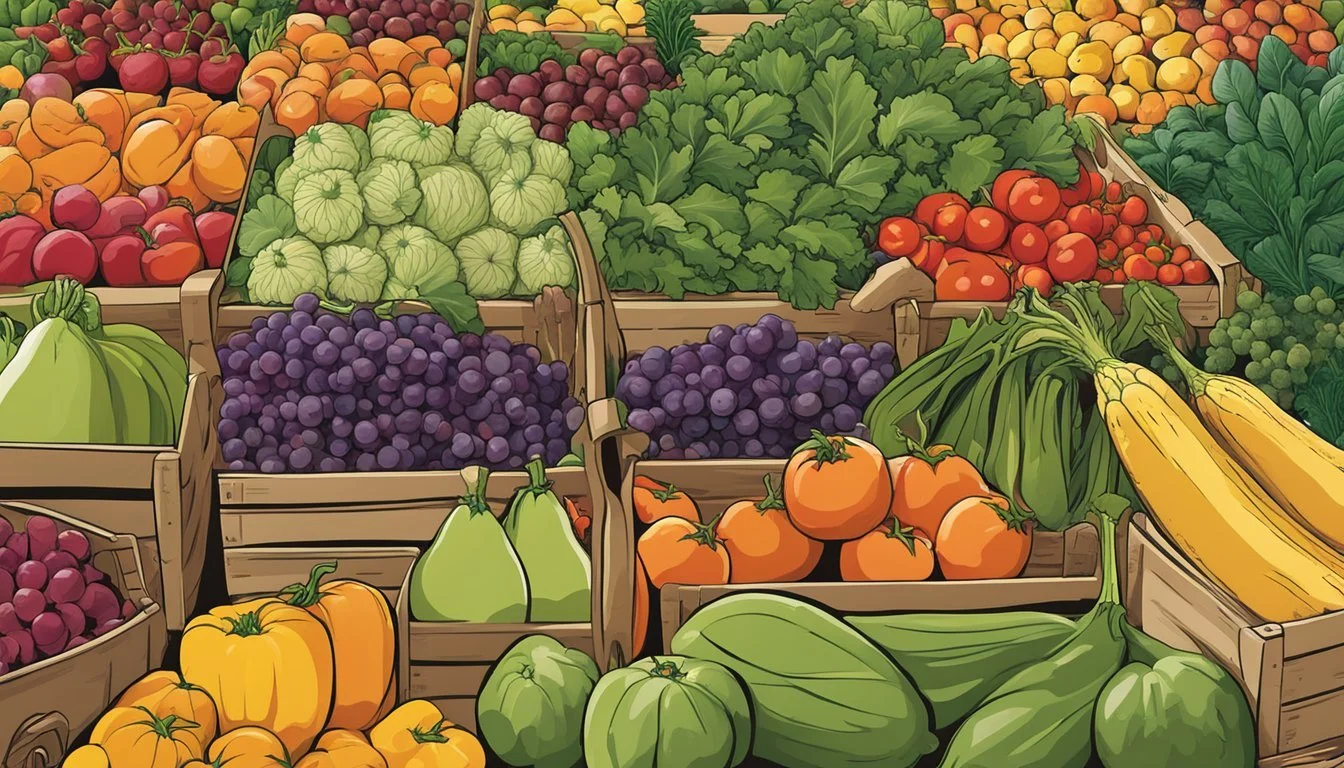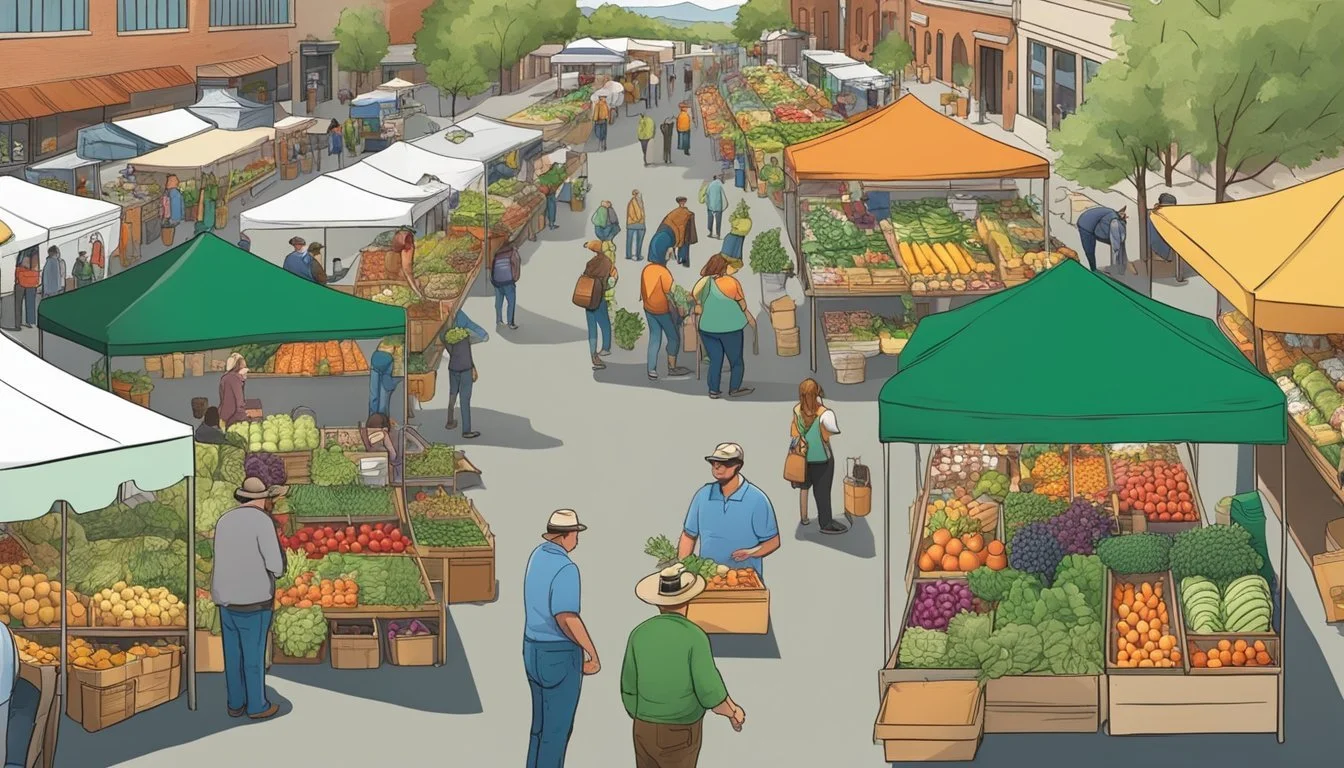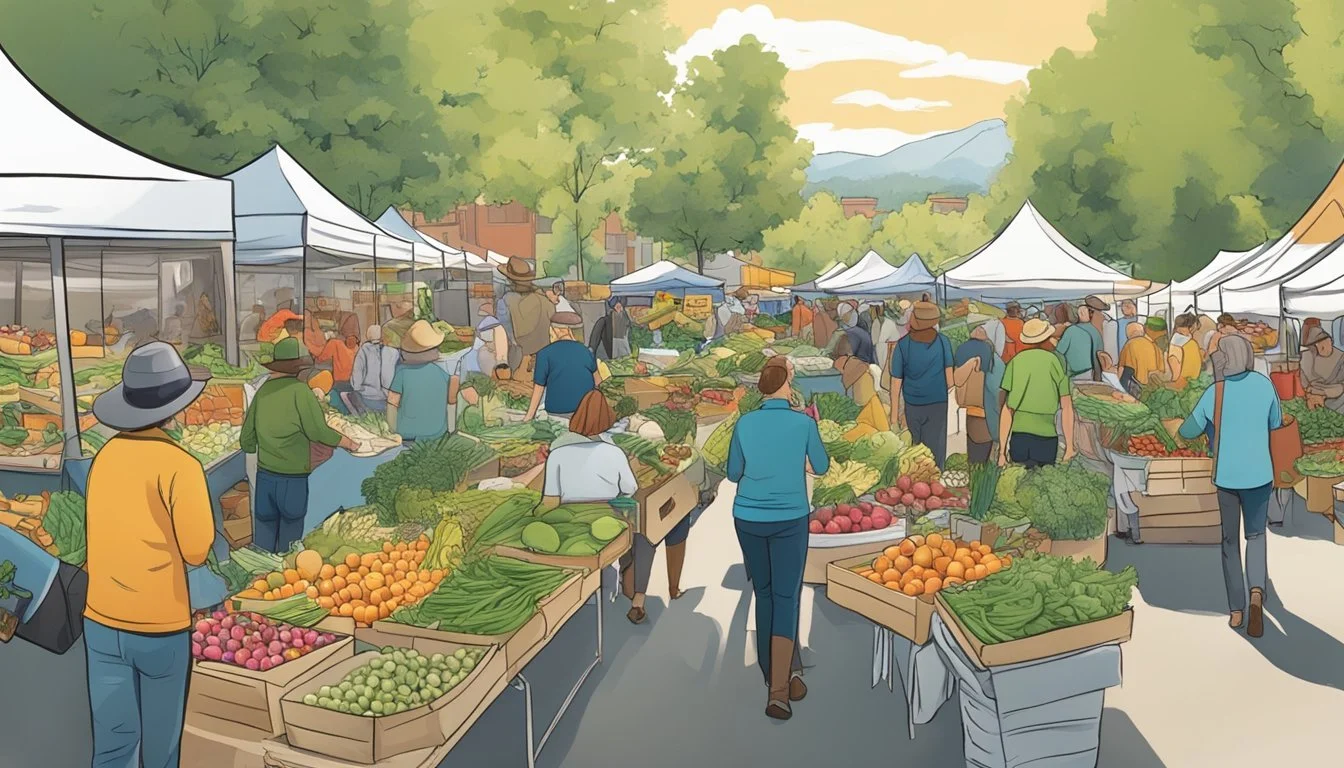Community Supported Agriculture (CSA) in Fort Collins, CO
A Guide to Local Farm Partnerships
Community Supported Agriculture, commonly abbreviated as CSA, is an agricultural model that has gained traction in Fort Collins, Colorado, mirroring a nationwide trend towards locally-grown, sustainable produce. In a CSA, consumers purchase shares, or memberships, from local farms and in return receive a portion of the farm's harvest throughout the growing season. This approach benefits consumers with fresh, seasonal vegetables, fruits, and other farm products, and creates a direct relationship between farmers and their community.
Fort Collins, nestled in Northern Colorado, boasts a variety of CSA programs that exemplify the city's commitment to supporting local agriculture. These programs provide residents with abundant options for accessing organic and often chemical-free produce directly from the growers. Farms like Green Dog Farm, Shire CSA, and Native Hill Farm are known for their CSA programs, where members receive a regular share of the farm's produce, fostering community engagement and promoting food awareness.
CSAs in Fort Collins offer a sustainable choice for residents to invest in their local food system. By participating in a CSA program, members not only enjoy fresh, high-quality produce but also contribute to the viability of local farms. This model of agriculture strengthens the farmer-consumer relationship and encourages a community-centric food culture, where people are more connected to the source of their food.
Understanding CSA
Community Supported Agriculture (CSA) is an innovative model for delivering farm products where benefits are shared among farmers and consumers. This section delves into its definition, advantages, and the historical context within the United States.
Definition and Principles
CSA, or Community Supported Agriculture, refers to a system in which consumers purchase shares from local farms before the growing season. In return, these consumers receive a portion of the farm products throughout the season. This model is hinged on mutual commitment; consumers shoulder some of the farmer's risk, while farmers commit to supply seasonal food of high quality.
Principles of CSA:
Shared Risk and Reward: Both the farmer and the consumer share the risks of farming, including poor harvests due to adverse weather conditions.
Community Engagement: CSAs often foster a stronger sense of community through direct interaction between farmers and consumers.
Sustainability: CSA models encourage sustainable farming practices that are less damaging to the environment.
Benefits of CSA for Consumers and Farmers
CSAs provide tangible benefits for both consumers and farmers alike. Consumers gain access to fresh, seasonal produce directly from the source, which often leads to more nutritious and flavorful food options. They also get to engage with the local agriculture community, gaining insights into how their food is grown.
For farmers, CSAs represent a stable income source, as they receive payment upfront at the start of the season. This model helps to mitigate some of the financial volatility inherent in farming. Additionally, by selling directly to the community, farmers can often capture a higher percentage of the final food dollar.
History of CSA in the U.S.
The CSA model is not new; it originated in Japan during the 1970s and made its way to the U.S. in the 1980s. Since then, it has seen considerable growth, particularly as consumer interest in local and sustainable food systems has increased. According to the U.S. Department of Agriculture's 2015 Local Food Marketing Practices Survey, the CSA model has been adopted by many farms across the United States. The Census of Agriculture has documented this trend, showing a rise in CSAs as consumers demand more direct relationships with their food producers.
CSA in Fort Collins, CO
Fort Collins, Colorado, boasts a rich variety of Community Supported Agriculture (CSA) programs that connect consumers directly with local farmers. These CSA farms offer fresh, often organically grown produce and foster community engagement through various educational programs.
Local CSA Farms
In the Fort Collins area, several CSA farms, such as Hope Farms, Garden Sweet Farm, and Happy Heart Farm, provide fresh seasonal produce to members. Jodar Farms and Blue Barrel Farm offer diverse CSA options, while Stubborn Roots Farm focuses on sustainable agriculture practices. Miller Farms is also part of the local CSA landscape, contributing to the wide array of choices for residents looking to subscribe for fresh, local produce.
Membership and Subscription
CSA memberships in Fort Collins typically involve a seasonal or annual subscription. Members pay upfront, which allows farms to plan accordingly for the season. In return, subscribers receive weekly or bi-weekly shares of produce. Some farms, like Garden Sweet, also offer the innovative option of a work share, inviting members to contribute labor in exchange for produce.
Seasonal Offerings
The CSAs in Fort Collins provide a rotation of crops adapted to the Colorado climate. From spring through fall, members can expect a variety of vegetables and fruits, with some farms offering winter shares made up of storage crops and greenhouse-grown produce. The bounty ranges from root vegetables to summer squash, heirloom tomatoes, and crisp autumn apples.
Community Engagement and Education
Many Fort Collins CSA farms, including Happy Heart Farm and Hope Farms, champion community engagement by encouraging members to visit the farm and participate in educational programs. These initiatives often highlight the benefits of sustainable agriculture and organic methods, thereby fostering a deeper understanding and connection between consumers and their food sources.
Economic Impact on Local Community
The success of CSA programs in Fort Collins positively impacts the local economy through direct-to-consumer sales. By subscribing to a CSA, members invest in local farmers, enabling them to maintain their operations and contribute to a robust local food system. This direct marketing approach benefits both consumers and producers, strengthening the community's economic base.
Environmental Benefits
CSAs in Fort Collins emphasize environmentally responsible farming practices, including the use of organic methods. By minimizing transportation and promoting organically grown produce, CSA farms help reduce carbon footprints and encourage biodiversity. This emphasis on sustainability contributes to the overall health of the region’s soil and water resources, as well as the global environment.
Operational Aspects of CSAs
Community Supported Agriculture (CSA) in Fort Collins, CO, operates with multifaceted components ensuring subscribers receive fresh, locally grown produce while supporting farmers' livelihoods. This section elucidates the growing practices, crop varieties, distribution methods, and financial structures that are fundamental to CSA operations in the region.
Growing Practices
CSAs in Fort Collins embrace organic farming practices, prioritizing the health of both consumers and the environment. Farmers meticulously select seeds to grow a range of vegetables, fruits, flowers, and herbs without the use of synthetic herbicides or pesticides. Crop rotation is a key technique to maintain soil vitality and minimize pests.
Organic Produce: Farmers commit to organic standards, which excludes synthetic inputs.
Soil Health: Crop rotation and other sustainable practices are utilized to preserve soil integrity.
Crop Variety and Selection
CSAs focus on providing a wide array of seasonal produce, from staple vegetables like corn to a variety of peppers and unique herbs. The selection often includes:
Vegetables: A mix of common and unique varieties tailored to local preferences.
Fruits: Seasonal offerings, often including berries and orchard fruits.
Farmers plan their crop selections to meet member demand while also considering crop viability in the local climate and soil conditions.
Distribution Models
The distribution of produce in Fort Collins CSAs adheres to models that ensure freshness and convenience. Two prevalent models are:
Market-Style: Members choose their produce directly from a farm stand or designated location.
Pick up: Prepackaged shares are available for members at specific locations and times.
These methods promote direct engagement between community members and the farm, fostering a sense of shared participation.
Financial Management
Financial sustainability is crucial for CSAs. Here's how they manage it:
Production Costs: Budgeting carefully for seeds, labor, and other inputs.
Shared Risk: Members invest in the farm's harvest, sharing both the bounty and the risks of farming.
Payment Methods: Diverse payment options, including cash, checks, and PayPal, accommodate member preferences.
By balancing production costs with revenue from members, CSAs aim to attain financial sustainability, ensuring that both farmers and members benefit from the arrangement.
Challenges and Considerations
Engaging in Community Supported Agriculture (CSA) in Fort Collins, Colorado presents several challenges which require careful consideration. Stakeholders must navigate limitations and risks, as well as contend with the impacts of seasonal and climatic factors on production.
Limitations and Risks
CSA programs operate on a model of shared risk between farmers and consumers. While this can lead to stronger community bonds and support for local agriculture, it also means that both parties assume the consequences of potential agricultural setbacks.
Financial Constraints: High production costs may limit the ability of CSA farms to expand or improve their operations, impacting sustainability efforts.
Diversification: A limited variety of seasonal food can affect customer satisfaction and retention, as diverse options enrich the CSA experience.
Seasonal and Climatic Factors
The growing season in Fort Collins is subject to various climatic variables, affecting the availability and abundance of produce throughout the year. Climate plays a crucial role in determining the success of farming efforts.
Weather Patterns: Extreme weather events can disrupt production and supply, which in turn may influence the economic stability of the CSA.
Planning for Climate: Farmers must anticipate and adapt to changing conditions to ensure a resilient and sustainable food system.
Direct Sales and Marketing
In Fort Collins, Colorado, direct sales and marketing of farm products play a pivotal role in sustaining local agriculture and connecting consumers with fresh, locally grown food. This practice supports local farms by offering fresh vegetables, meat, and other farm products directly to consumers through various channels.
Farmers Markets and Farm Stands
Farmers Markets and Farm Stands act as traditional settings for direct-to-consumer sales. Fort Collins hosts a variety of farmers markets, where community farms and market farms offer an array of produce. The LocalHarvest database can help consumers locate these farm stands and farmers markets, which feature local food directly from the producers.
Location & Timing: Varies; typically spring to fall
Products: Fresh vegetables, meats, and other farm products
Online Sales Platforms
The adoption of Online Sales Platforms has allowed farms to reach a wider audience. These platforms provide a space for farms to list their available products and facilitate the purchase and pick-up of local food.
Access: Consumers can order from the comfort of their home
Benefit: Expands market reach for small-scale farmers
Community Events and Relationships
Community Events and Relationships foster direct marketing opportunities and build connections between producers and consumers. These events often feature local food and farm products and can be associated with non-profit initiatives aimed at strengthening community ties.
Events: Local fairs, food festivals, and educational workshops
Impact: Promotes awareness and community engagement
Innovative Marketing Strategies
Innovative Marketing Strategies, such as Community Supported Agriculture (CSA), are valuable for market farms. Through CSA, consumers commit to purchasing a share of a farm's harvest, providing stable revenue for farmers and access to seasonal produce for consumers.
CSA Model: Consumers pre-purchase a portion of the harvest
Advantage: Direct financial support for farmers
Education and Consumer Awareness
Education and Consumer Awareness initiatives are crucial to informing consumers about the benefits of buying directly from local farms. By understanding the importance of local agriculture, consumers are more likely to engage in direct marketing channels such as farm stands, farmers markets, and CSAs.
Tools: Workshops, farm tours, and educational campaigns
Outcome: Informed consumers support local agriculture
Additional Offerings and Diversification
Fort Collins Community Supported Agriculture (CSA) programs have expanded their offerings, incorporating livestock, meat shares, and various additional products and services. This diversification aims to cater to a broader set of community needs, from farm-fresh eggs to seasonal flowers.
Livestock and Meat Shares
CSA programs in Fort Collins provide more than just vegetables. For instance, Jodar Farms offers shares that include a rich assortment of meats from chickens, pigs, and cattle, accommodating those interested in adding local, sustainably-raised proteins to their diets. Members might receive a mixture of beef, pork, and poultry, depending on their specific share.
Meat Shares: Typically include a variety of beef, pork, and poultry.
Eggs: Often available as an add-on to vegetable shares or as part of a meat share.
Additional Products and Services
Beyond traditional produce and meat shares, CSAs like Garden Sweet Farm amplify their community offerings by providing a selection of flowers, reflecting an appreciation for both the aesthetic and ecological benefits they bring. Stubborn Roots Farm, not limited to edible products, supplies items such as firewood and lumber, demonstrating the diverse resources that CSAs contribute to local economies.
Flowers: Seasonal bouquets available for weekly pick-up.
Firewood and Lumber: Offered by farms expanding beyond food products.
The additional offerings at CSA programs in Fort Collins reflect a commitment to diverse, sustainable agriculture and community enrichment. These expanded services and products allow members to support local agriculture in a comprehensive manner that goes beyond the dinner plate.






